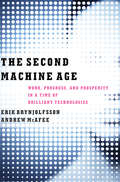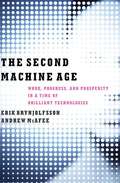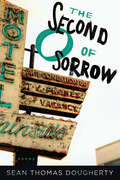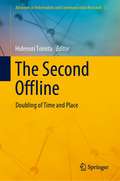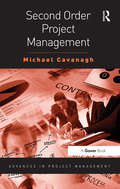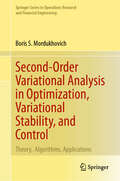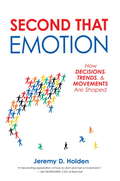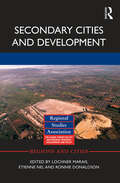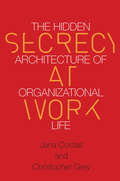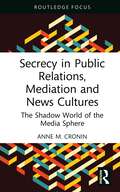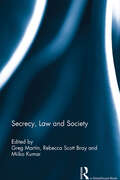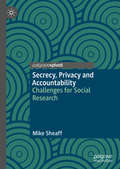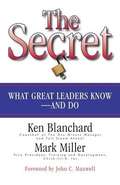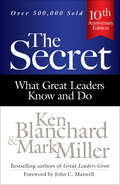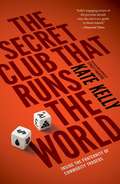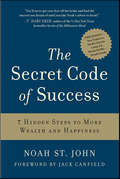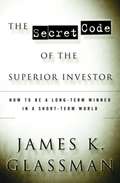- Table View
- List View
The Second Machine Age: Work, Progress, And Prosperity In A Time Of Brilliant Technologies
by Erik Brynjolfsson Andrew McafeeA New York Times Bestseller A revolution is under way. In recent years, Google's autonomous cars have logged thousands of miles on American highways and IBM's Watson trounced the best human Jeopardy! players. Digital technologies--with hardware, software, and networks at their core--will in the near future diagnose diseases more accurately than doctors can, apply enormous data sets to transform retailing, and accomplish many tasks once considered uniquely human. In The Second Machine Age MIT's Erik Brynjolfsson and Andrew McAfee--two thinkers at the forefront of their field--reveal the forces driving the reinvention of our lives and our economy. As the full impact of digital technologies is felt, we will realize immense bounty in the form of dazzling personal technology, advanced infrastructure, and near-boundless access to the cultural items that enrich our lives. Amid this bounty will also be wrenching change. Professions of all kinds--from lawyers to truck drivers--will be forever upended. Companies will be forced to transform or die. Recent economic indicators reflect this shift: fewer people are working, and wages are falling even as productivity and profits soar. Drawing on years of research and up-to-the-minute trends, Brynjolfsson and McAfee identify the best strategies for survival and offer a new path to prosperity. These include revamping education so that it prepares people for the next economy instead of the last one, designing new collaborations that pair brute processing power with human ingenuity, and embracing policies that make sense in a radically transformed landscape. A fundamentally optimistic book, The Second Machine Age will alter how we think about issues of technological, societal, and economic progress.
The Second Machine Age: Work, Progress, and Prosperity in a Time of Brilliant Technologies
by Erik Brynjolfsson Andrew McafeeA revolution is under way.<P> In recent years, Google’s autonomous cars have logged thousands of miles on American highways and IBM’s Watson trounced the best human Jeopardy! players. Digital technologies—with hardware, software, and networks at their core—will in the near future diagnose diseases more accurately than doctors can, apply enormous data sets to transform retailing, and accomplish many tasks once considered uniquely human.<P> In The Second Machine Age MIT’s Erik Brynjolfsson and Andrew McAfee—two thinkers at the forefront of their field—reveal the forces driving the reinvention of our lives and our economy. As the full impact of digital technologies is felt, we will realize immense bounty in the form of dazzling personal technology, advanced infrastructure, and near-boundless access to the cultural items that enrich our lives.<P> Amid this bounty will also be wrenching change. Professions of all kinds—from lawyers to truck drivers—will be forever upended. Companies will be forced to transform or die. Recent economic indicators reflect this shift: fewer people are working, and wages are falling even as productivity and profits soar.<P> Drawing on years of research and up-to-the-minute trends, Brynjolfsson and McAfee identify the best strategies for survival and offer a new path to prosperity. These include revamping education so that it prepares people for the next economy instead of the last one, designing new collaborations that pair brute processing power with human ingenuity, and embracing policies that make sense in a radically transformed landscape.<P> A fundamentally optimistic book, The Second Machine Age will alter how we think about issues of technological, societal, and economic progress.
The Second O of Sorrow (American Poets Continuum Series #165)
by Sean Thomas DoughertySean Thomas Dougherty celebrates the struggles, the dignity, and the joys of working-class life in the Rust Belt. Finding delight in everyday moments—a night at a packed karaoke bar, a father and daughter planting a garden, a biography of LeBron James as a metaphor for Ohio—these poems take pride in the people who survive despite all odds, who keep going without any concern for glory, fighting with wit and grace for justice, for joy, every god damned day.
The Second Offline: Doubling of Time and Place (Advances in Information and Communication Research #3)
by Hidenori TomitaThis book presents current research on mobile Internet society. Past research was not able to show a clear analytical framework, thus was unable to close in on the fundamental changes in that society. This book, however, analyzes mobile Internet society by introducing the concept of “doubling of time and place” and the analytical framework of the “second offline.” The emergence of the smartphone has made Internet use easier, and now, people are constantly using online information in the midst of their daily lives. Our society is transitioning from the first offline society, a society without being connected to Internet, to the second offline society, where users are connected to the Internet at all times. In this second offline society, our sense of time and place are beginning to change. Broadcast and communication media have made possible the overlapping of different places, which has been called the doubling of place. Furthermore, virtual reality (VR) and augmented reality (AR) technologies have enabled the overlap of different times, which this book calls the doubling of time. The smartphone makes both possible. With the second offline and the doubling of time and place as keywords, the book takes into consideration research that includes, among other topics, the media usage of young adults, selfies, education, social media usage, mobile games, work stations, and consumer activity in the mobile Internet society.
Second Order Project Management (Advances in Project Management)
by Michael CavanaghIf you do what you've always done, you'll get what you've always got, and if it's not good enough, you need to do something else. As project complexity increases, so too does the need to do new things. The existing Project Management tools - examples being Earned Value Management, PRINCE2, Lifecycle Management, PMBOK® - are incredibly useful; but they were designed for linear project development in a stable, understood environment. We term them 'First Order'. Second Order Project Management (PM) goes beyond, addressing the issues of a complex, unstable, uncertain environment with all its associated difficulties. Second Order PM has to address four major issues: the conspiracy of optimism, inappropriate contracting models, the application of methods and tools capable of dealing with complexity, and the need for creative, inspirational, adhocratic leadership. These problems are compounded by the need to convince executive sponsors from different disciplines to invest in the necessary process improvement - this book is designed to help alleviate the frustration that every member of the profession has experienced when trying to gain such approval. Illustrated by interviews with an international group of very senior managers responsible for managing highly complex projects, Michael Cavanagh explains why there is nothing magical, or even complicated, about Second Order PM. The techniques discussed include aspects of System Thinking, Experiential Learning and its application, Ethics and Governance, Stakeholder Relationships, Appropriate Contracting Models, Outcome-driven Management and Leadership Behaviour, all recognised as increasingly necessary in direct proportion to the complexity of the project at hand.
Second-Order Variational Analysis in Optimization, Variational Stability, and Control: Theory, Algorithms, Applications (Springer Series in Operations Research and Financial Engineering)
by Boris S. MordukhovichThis fundamental work is a sequel to monographs by the same author: Variational Analysis and Applications (2018) and the two Grundlehren volumes Variational Analysis and Generalized Differentiation: I Basic Theory, II Applications (2006). This present book is the first entirely devoted to second-order variational analysis with numerical algorithms and applications to practical models. It covers a wide range of topics including theoretical, numerical, and implementations that will interest researchers in analysis, applied mathematics, mathematical economics, engineering, and optimization. Inclusion of a variety of exercises and commentaries in each chapter allows the book to be used effectively in a course on this subject. This area has been well recognized as an important and rapidly developing area of nonlinear analysis and optimization with numerous applications. Consisting of 9 interrelated chapters, the book is self-contained with the inclusion of some preliminaries in Chapter 1.Results presented are useful tools for characterizations of fundamental notions of variational stability of solutions for diverse classes of problems in optimization and optimal control, the study of variational convexity of extended-real-valued functions and their specifications and variational sufficiency in optimization. Explicit calculations and important applications of second-order subdifferentials associated with the achieved characterizations of variational stability and related concepts, to the design and justification of second-order numerical algorithms for solving various classes of optimization problems, nonsmooth equations, and subgradient systems, are included. Generalized Newtonian algorithms are presented that show local and global convergence with linear, superlinear, and quadratic convergence rates. Algorithms are implemented to address interesting practical problems from the fields of machine learning, statistics, imaging, and other areas.
Second That Emotion
by Jeremy D. HoldenFor businesspeople who want to see their company or brand break through, this book is both essential and entertaining reading. For the rest of us, the author provides a window into our decision-making processes, and how emotion-based illogical leaps drive our support for movements, whether they are political, commercial, or related to popular culture. Why do more than 30 percent of Americans believe President Obama is a Muslim? Why do most fans who supported Dove®'s "campaign for real beauty" feel comfortable ignoring the fact that the brand's parent company, Unilever, was also behind the Axe® campaign, a brand that has blatantly stereotyped women? Why is Yoko Ono still held responsible for the breakup of the Beatles? These and other random, yet related, questions are explained in here. An advertising and communications expert traces the fascinating process whereby a passion for an idea, a politician, a celebrity, or a brand gives rise to a set of illogical beliefs that becomes the basis for a powerful movement. Conventional wisdom has it that spin doctors and Madison Avenue are responsible for manipulating our thoughts, causing us to endorse ideas or buy products that we would otherwise reject outright. Holden shows that while advertising and propaganda can provide a spark and social media provides the kindling, individuals create consumer, political, and cultural trends based, more often than not, on thinking that they know logically to be flawed.
Second Thoughts on Going Public
by Richard SalomonIn 1961, Richard Salomon, the sole owner of Charles of the Ritz, decided to issue public shares in his company. The perceived advantages were the possibility of diversification, establishment of value for estate and inheritance taxes, availability of equity, personal satisfaction, liquidity, and the ability to retain control of the business. When the shares were offered, disadvantages became apparent. Closely knit executives began jockeying for positions and personal relations became strained. Short-term results became a priority over long-range planning. Stockholders were primarily interested in share value, expressing opposition to ventures that jeopardized short-term profit for the sake of long-term growth.
The Second Transition: Eastern Europe in Perspective
by Stefania Fabrizio Daniel Leigh Ashoka ModyA report from the International Monetary Fund.
Second-Wave Millennials: Tapping the Potential of America's Youth
by Warren WrightAuthor Warren Wright takes you on an engaging journey through the generations in the workplace, starting with “Dave” the Boomer, and ending with the newest kid on the block—“Samanthe”, a Second-Wave Millennial. Page-turning narrative peppered with practical solutions tells the compelling story of how different generations can get along in the workplace—with an emphasis on tapping the potential of the newest generation—Second-Wave Millennials. Second-Wave Millennials reveals: 5 ways to craft an ideal workplace for all generations 4 lifestyle themes that make up Millennials’ identity The top soft skills required for the newly-hired Second-WaveMillennials
Secondary Cities and Development (Regions and Cities)
by Lochner Marais, Etienne Nel and Ronnie DonaldsonThe role secondary cities play in the global space economy and national urban hierarchies is increasingly receiving attention from scholars and international agencies, most notably the Cities Alliance. Secondary Cities and Development considers the role of secondary cities through the lens of South Africa, a middle-income country with characteristics of both the developed and developing worlds. This book brings together a broad overview of international literature on secondary cities in South Africa and mirrors them against global experience. Chapters emphasize the importance of secondary cities as regional services areas, their potential roles in rural development, the vulnerabilities to which they are prone and their signifcant potential. By means of review, six South African case studies, and an assessment of contemporary policy approaches towards these cities, this unique volume provides insight into a spectrum of globally significant challenges. This book would be of interest to academics and policy makers working in urban studies or regional development.
Secrecy at Work: The Hidden Architecture of Organizational Life
by Christopher Grey Jana CostasSecrecy is endemic within organizations, woven into the fabric of our lives at work. Yet, until now, we've had an all-too-limited understanding of this powerful organizational force. Secrecy is a part of work, and keeping secrets is a form of work. But also, secrecy creates a social order--a hidden architecture within our organizations. Drawing on previously overlooked texts, as well as well-known classics, Jana Costas and Christopher Grey identify three forms of secrecy: formal secrecy, as we see in the case of trade and state secrets based on law and regulation; informal secrecy based on networks and trust; and public or open secrecy, where what is known goes undiscussed. Animated with evocative examples from scholarship, current events, and works of fiction, this framework presents a bold reimagining of organizational life.
Secrecy in Public Relations, Mediation and News Cultures: The Shadow World of the Media Sphere (Routledge Focus on Media and Cultural Studies)
by Anne M. CroninThis book investigates the relationship of secrecy as a social practice to contemporary media, news cultures and public relations. Drawing on Georg Simmel’s theorisation of how secrecy produces a ‘second world’ alongside the ‘obvious world’ and creates and reshapes social relations, Anne Cronin argues for close analysis of the PR industry as a powerful vector of secrecy and an examination of its relationship to news cultures. Using case studies and in-depth interviews, as well as recent research in media and cultural studies, sociology, journalism studies and communication studies, the book analyses how PR practices generate a second, shadow world of the media sphere which has a profound impact on the ‘obvious world’. It interrogates both the PR industry’s and news culture’s role in shaping social relations for a digital media landscape, and those initiatives promoting transparency of data and decision-making processes. An insightful, interdisciplinary approach to debates on media and power, this book will appeal to students of public relations, sociology, media studies, cultural studies and communication studies. It will also be of interest to scholars and practitioners working at the intersections of media, social relations and public trust.
Secrecy, Law and Society
by Greg Martin Rebecca Scott Bray Miiko KumarCommentators have shown how a ‘culture of security’ ushered in after the terrorist attacks of 11 September 2001 has involved exceptional legal measures and increased recourse to secrecy on the basis of protecting public safety and safeguarding national security. In this context, scholars have largely been preoccupied with the ways that increased security impinges upon civil liberties. While secrecy is justified on public interest grounds, there remains a tension between the need for secrecy and calls for openness, transparency and disclosure. In law, secrecy has implications for the separation of powers, due process, and the rule of law, raising fundamental concerns about open justice, procedural fairness and human rights. Beyond the counterterrorism and legal context, scholarly interest in secrecy has been concerned with the credibility of public and private institutions, as well as the legacies of secrecy across a range of institutional and cultural settings. By exploring the intersections between secrecy, law and society, this volume is a timely and critical intervention in secrecy debates traversing various fields of legal and social inquiry. It will be a useful resource for academic researchers, university teachers and students, as well as law practitioners and policymakers interested in the legal and socio-legal dimensions of secrecy.
Secrecy, Privacy and Accountability: Challenges for Social Research
by Mike SheaffPublic mistrust of those in authority and failings of public organisations frame disputes over attribution of responsibility between individuals and systems. Exemplified with examples, including the Aberfan disaster, the death of Baby P, and Mid Staffs Hospital, this book explores parallel conflicts over access to information and privacy.The Freedom of Information Act (FOIA) allows access to information about public organisations but can be in conflict with the Data Protection Act, protecting personal information. Exploring the use of the FOIA as a research tool, Sheaff offers a unique contribution to the development of sociological research methods, and debates connected to privacy and secrecy in the information age. This book will provide sociologists and social scientists with a fresh perspective on contemporary issues of power and control.
Secrecy World: Inside the Panama Papers Investigation of Illicit Money Networks and the Global Elite
by Jake BernsteinA two-time Pulitzer Prize-winning journalist takes us inside the world revealed by the Panama Papers, a landscape of illicit money, political corruption, and fraud on a global scale. A hidden circulatory system flows beneath the surface of global finance, carrying trillions of dollars from drug trafficking, tax evasion, bribery, and other illegal enterprises. This network masks the identities of the individuals who benefit from these activities, aided by bankers, lawyers, and auditors who get paid to look the other way. In Secrecy World, the Pulitzer Prize winning investigative reporter Jake Bernstein explores this shadow economy and how it evolved, drawing on millions of leaked documents from the files of the Panamanian law firm Mossack Fonseca—a trove now known as the Panama Papers—as well as other journalistic and government investigations. Bernstein shows how shell companies operate, how they allow the superwealthy and celebrities to escape taxes, and how they provide cover for illicit activities on a massive scale by crime bosses and corrupt politicians across the globe.Bernstein traveled to the Caribbean, Latin America, Europe, and within the United States to uncover how these strands fit together—who is involved, how they operate, and the real-world impact. He recounts how Mossack Fonseca was exposed and what lies ahead for the corporations, banks, law firms, individuals, and governments that are implicated.Secrecy World offers a disturbing and sobering view of how the world really works and raises critical questions about financial and legal institutions we may once have trusted.
The Secret: What Great Leaders Know -- and Do
by Ken Blanchard Mark MillerThe Secret answers a question most leaders ask at some point in their career, "What do I need to do to be a great leader?" The Secret explains the five essential practices exhibited by the best leaders and provides practical ideas on how to make these a reality in your life. Most leadership books are too theoretical. The Secret is practical. Most leadership books deal with only a portion of the challenge that faces leaders. The Secret introduces a leadership framework and a set of practices that work in all settings. The Secret puts leadership in a form that everyone can easily understand, embrace and pursue.
The Secret: What Great Leaders Know and Do
by Ken Blanchard Mark MillerThe authors of Great Leaders Grow use a fable to lay out what is the secret to great leadership in this internationally bestselling guide.It’s a question that everyone in a position of authority—whether in a multinational corporation or a local volunteer group—wonders sooner or later. Here Ken Blanchard, whose books on leadership have sold over twenty million copies, and Mark Miller, who worked his way up from line worker to vice president of Chick-Fil-A, one of the largest fast-food restaurant chains in the country, uncover the secret that great leaders already know and detail what you need to do to truly inspire and motivate others.The authors get at the heart of what makes a leader successful using a classic business fable. Newly promoted but struggling young executive Debbie Brewster asks her mentor, “What is the secret of great leaders?” His reply—“great leaders serve”—flummoxes her, but over time he reveals the five fundamental ways that leaders succeed through service. Along the way, Debbie learns:• Why great leaders seem preoccupied with the future• How people on the team ultimately determine your success or failure• What three arenas require continuous improvement• Why true success in leadership has two essential components• How to knowingly strengthen—or unwittingly destroy—leadership credibilityThis new edition includes a leadership self-assessment so readers can measure to what extent they lead by serving and where they can improve. The authors have also added answers to the most frequently asked questions about how to apply the SERVE model in the real world. As practical as it is uplifting, The Secret shares Blanchard and Miller’s wisdom about leadership in a form that anyone can easily understand and implement.“You don’t have to be older to be a great leader. The Secret shows how to lay the foundation for powerful servant leadership early in your career to maximize your impact.” —Claire Diaz-Ortiz, Head of Corporate Innovation and Philanthropy at Twitter, Inc. and author of Twitter for Good and Hope Runs“When you learn The Secret, don't keep it to yourself. Share it and use it with your people. It will make a difference in their lives and their performance.” —Donald G. Soderquist, former Vice Chairman, Wal-Mart, and founder of the Soderquist Center for Leadership and Ethics, John Brown University“If you know The Secret, both relationships and results will prosper. It's a perfect move in your life from success to significance.” —Bob Buford, author of Halftime
The Secret Club That Runs the World: Inside the Fraternity of Commodity Traders
by Kate KellyWhen most people think of the drama of global finance, they think of stocks and bonds, venture capital, high-tech IPOs, and complex mortgagebacked securities. But commodities? Crude oil and soybeans? Copper and wheat? What could be more boring? <P><P> That's exactly what the elite commodity traders want you to think. They don't seek the media spotlight. They don't want to be as famous as Warren Buffett or Bill Gross. Their astonishing wealth was created in near-total obscurity, because they dwelled either in closely held private companies or deep within large banks and corporations, where commodity profits and losses weren't broken out. <P> But if the individual participants in the great commodities boom of the 2000s went unnoticed, their impact did not. Over several years the size of the market exploded, and so did prices for raw materials--raising serious questions about whether the big traders were intentionally jacking up the cost of gasoline, food, and other essentials bought by ordinary people around the world. What was really driving all those price spikes? <P> Now Kate Kelly, the bestselling author of Street Fighters, takes us inside this secretive inner circle that controls so many things we all depend on. She gets closer than any previous reporter to understanding these whip-smart, aggressive, and often egomaniacal men (yes, they are nearly all men). They work hard, play hard, flaunt their wealth, and bet millions every day on a blend of facts, analysis, and pure gut instinct. <P> Kelly's narrative focuses on one of the most extraordinary periods in financial history. Though the practice of gaming out price changes in commodities goes back to ancient Mesopotamia, it had never before reached the extremes of the early to mid-2000s. Kelly exposes the role of the hedge funds, banks, brokers, and regulators in this volatile market, through fascinating stories of "secret club" members such as . . . Pierre Andurand, a self-made multimillionaire who generated the winningest annual performance ever for an oil trader in 2008 and hired Elton John to perform at his wedding. Ivan Glasenberg, whose secretive Swiss commodities giant, Glencore, founded by the infamous American fugitive Marc Rich, orchestrated a massive merger with the help of former UK prime minister Tony Blair. Jon Ruggles, a brash know-it-all--recruited by Delta Air Lines to revitalize the airline's fuelhedging business, he continuined to make trades in his personal account, a questionable practice given his position. Drawing on her exclusive access to the secret club, and following the trail from New York to Houston, London, Dubai, and beyond, Kelly reveals the immense power in the hands of a few, and the so-far contentious efforts by the Obama administration to rein in the cowboys.
The Secret Code of Success: 7 Hidden Steps to More Wealth and Happiness
by Noah St. JohnAmericans spend more than $11 billion a year on self-help products—everything from books to diet pills to career coaches to seminars. So why—with all this time, money, and energy being spent—are so few people living the life they really want? Why are millions of smart, talented, motivated people still going through life with one foot on the brake? Here's the real Secret: You don't need any more how-to-succeed information to reach your full potential.The problem isn't lack of motivation or lack of information. The real problem is that most people focus on the "how-to" aspects of success taught by traditional self-help programs, without coming to terms with what productivity expert Noah St. John calls your "head trash"—the subconscious, emotional roadblocks that prevent people from acting on their real hopes, dreams, and ambitions. In this groundbreaking book, based on work with thousands of clients around the world, Noah St. John has created a remarkable, step-by-step approach that helps you achieve long-term happiness, success, and wealth. In The Secret Code of Success, you will learn how to: Eliminate the causes of self-sabotage and fear of successAllow yourself to make more moneyRemove stress while dramatically increasing personal productivityImprove relationships with coworkers, family, and friendsExperience enhanced feelings of happiness, connection, and loveThe Secret Code of Success shows that, when it comes to success, the conscious mind is exactly the wrong place to start. It's only when we first conquer the self-sabotage of our subconscious (which accounts for 90 percent of our behavior) that we can truly begin to enjoy a life filled with success. This insight is at the core of The Secret Code of Success and leads to Noah's revolutionary 7-step method for eliminating these psychological obstacles. True financial freedom and personal success is possible at last!The Secret Code of Success shows you how to get your foot off the brake and start living the life you deserve.
The Secret Code of the Superior Investor
by James K. GlassmanIn these uncertain times, learn how to crack the code and become a superior investor. Don’t worry about the market, the economy, or the Fed. Instead, concentrate on what’s important: how to construct your own bulletproof portfolio by finding the best individual stocks and mutual funds for you. This timely book is your guide to volatile markets. We live in a world saturated with the short-term: Who’s up, who’s down? Which stocks rose yesterday, which fell? Did corporate profits rise (or drop) last qu...
The Secret Financial Life of Food: From Commodities Markets to Supermarkets (Arts and Traditions of the Table: Perspectives on Culinary History)
by Kara NewmanOne morning while reading Barron's, Kara Newman took note of a casual bit of advice offered by famed commodities trader Jim Rogers. "Buy breakfast," he told investors, referring to the increasing value of pork belly and frozen orange juice futures. The statement inspired Newman to take a closer look at agricultural commodities, from the iconic pork belly to the obscure peppercorn and nutmeg. The results of her investigation, recorded in this fascinating history, show how contracts listed on the Chicago Mercantile Exchange can read like a menu and how market behavior can dictate global economic and culinary practice. The Secret Financial Life of Food reveals the economic pathways that connect food to consumer, unlocking the mysteries behind culinary trends, grocery pricing, and restaurant dining. Newman travels back to the markets of ancient Rome and medieval Europe, where vendors first distinguished between "spot sales" and "sales for delivery." She retraces the storied spice routes of Asia and recounts the spice craze that prompted Christopher Columbus's journey to North America, linking these developments to modern-day India's bustling peppercorn market. Newman centers her history on the transformation of corn into a ubiquitous commodity and uses oats, wheat, and rye to recast America's westward expansion and the Industrial Revolution. She discusses the effects of such mega-corporations as Starbucks and McDonalds on futures markets and considers burgeoning markets, particularly "super soybeans," which could scramble the landscape of food finance. The ingredients of American power and culture, and the making of the modern world, can be found in the history of food commodities exchange, and Newman connects this unconventional story to the how and why of what we eat.
Secret Formula: The Inside Story of How Coca-Cola Became the Best-Known Brand in the World
by Frederick AllenHow a Victorian-era medicine spawned one of the nation's richest companies and became the world's most recognizable brandSecret Formula follows the colorful characters who turned a relic from the patent medicine era into a company worth $80 billion. Award-winning reporter Frederick Allen's engaging account begins with Asa Candler, a nineteenth-century pharmacist in Atlanta who secured the rights to the original Coca-Cola formula and then struggled to get the cocaine out of the recipe. After many tweaks, he finally succeeded in turning a backroom belly-wash into a thriving enterprise. In 1919, an aggressive banker named Ernest Woodruff leveraged a high-risk buyout of the Candlers and installed his son at the helm of the company. Robert Woodruff spent the next six decades guiding Coca-Cola with a single-minded determination that turned the soft drink into a part of the landscape and social fabric of America. Written with unprecedented access to Coca-Cola's archives, as well as the inner circle and private papers of Woodruff, Allen's captivating business biography stands as the definitive account of what it took to build America's most iconic company and one of the world's greatest business success stories.
Secret Formulas of the Wizard of Ads
by Roy H. WilliamsFrom the Book jacket: In 100 chapters full of wit, wisdom and uncommon good sense, Secret Formulas conjures up more of the Wizard's provocative observations on advertising, business, and life that won The Wizard of Ads last year's Business Book of the Year Award - only this time, the book has nuts, bolts, and even more bite! The Wizard's secret formulas will show you How to find a champion to sell your ideas Why targeting your market can be a big mistake How to get customers to remember you Why bankers think backwards How to write miraculous ads Why the brain contains 100,000 new worlds Why being "out of style" can be profitable How to hire wisely and fire compassionately How success can send you to the poor house How to remember what's really important in life Just peek inside one of these chapters. The Wizard will give you your own crystal ball - one powerful enough to let you see and create your future. The Wizard Who Got Away (p. 40) Living with Tarzan in the Jungle (p. 44) Escape the Dungeon of Depression (p. 62) Surprising Broca (p. 70) The Midnight Street Sweeper (p. 98) Not So Stupid (p. 150) Don't Get Your Panties in a Bind (p. 180) A Pinpoint in the Darkness (p. 196) History's Greatest Hoax (p. 204) What 1 Learned at a Bar Mitzvah (p. 214) Secret Formulas of the Wizards of Ads is certainly about advertising, business, friendship, and life. But more than that, it's a book about you.
Secret Freedom: How to Fly Again and Gain Freedom from Keeping Secrets
by Ilonka DeatonSecret Freedom is a practical guide to help any individual overcome keeping secrets. Ilonka Deaton explores the pitfalls and struggles people carry when they keep secrets and the resulting effects. She guides each reader into a journaling experience to not only explore their own story but to walk deeper into a place of healing and freedom. Secret Freedom provides real life stories as examples and readers find a meaningful avenue to explore their own struggles. Through this practical guide, readers gain a stronger emotional voice and learn how to fly again.
